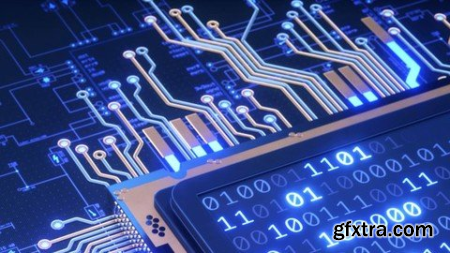
Published 1/2023MP4 | Video: h264, 1280x720 | Audio: AAC, 44.1 KHzLanguage: English | Size: 778.26 MB | Duration: 1h 46m
"An Introduction to the Fundamentals of Firmware Eeering for Embedded Systems" What you'll learn Students will learn about the fundamental concepts and principles of firmware development, including memory management, communication protocols, and system arch Students will be able to design, implement, and test firmware solutions for embedded systems using various programming languages and tools. Students will be able to troubleshoot and debug firmware code using various debugging tools and techniques. Students will be able to perform system performance analysis and optimization to ensure that their firmware solutions are efficient and reliable. Requirements No programming experience is needed. you will learn everything, you need to know Description Firmware eeering is a crucial field in the world of computer science and eeering, as it involves the design, development, and maintenance of firmware for various electronic devices and systems. In this course, you will learn the fundamental concepts, tools, and techniques that are essential for building reliable and efficient firmware solutions.You will start by learning about the different types of firmware, including boot firmware, application firmware, and device firmware. You will also learn about the key challenges and considerations that are involved in firmware development, such as memory management, resource allocation, and security.In addition, you will learn about the different communication protocols and interfaces that are commonly used in firmware eeering, including UART, I2C, SPI, USB, and Ethernet. You will also learn about the role of operating systems and networking in firmware development, and how to develop device drivers and system-level software.Another key focus of this course is on debugging and troubleshooting techniques. You will learn how to use various debugging tools and techniques, such as debuggers, analyzers, and simulators, to identify and fix issues in your firmware. You will also learn about code review and peer review, which are essential for ensuring the quality and reliability of your firmware.Finally, you will learn about the importance of requirements gathering and specification in firmware development, as well as how to optimize system performance and use collaboration tools and techniques to work effectively with others. You will also learn about security best practices and protocols, and how to integrate hardware and firmware in a co-development process.Throughout this course, you will have the opportunity to apply your knowledge through hands-on exercises and projects, giving you the skills and experience you need to succeed in the world of firmware eeering. Overview Section 1: Chapter 1: Hardware Architecture and Design Lecture 1 1.0: Introduction Lecture 2 1.1: Embedded systems concepts and programming Lecture 3 1.2: Real- operating systems (RTOS) and bare-metal systems Lecture 4 1.3: Interrupts and interrupt handling Lecture 5 1.4: Communication protocols and interfaces (e.g. UART, I2C, SPI, USB, Ethernet) Lecture 6 1.5: Memory management and resource allocation Lecture 7 1.6: Power management techniques (e.g. power gating, clock gating, dynamic volta Lecture 8 1.7: Debugging and troubleshooting techniques Section 2: Chapter 2: Software Development and Design Lecture 9 2.0: Introduction Lecture 10 2.1: Code optimization and performance tuning Lecture 11 2.2: Design patterns and software architecture Lecture 12 2.3: Version control and configuration management Lecture 13 2.4: Build systems and automation Lecture 14 2.5: Testing and quality assurance Lecture 15 2.6: Documentation and technical writing Lecture 16 2.7: Hardware-software integration and debugging Section 3: Chapter 3: Skills and Professional Development Lecture 17 3.0:Introduction Lecture 18 3.1: Communication and collaboration skills Lecture 19 3.2: management and project management Lecture 20 3.3: Agile development methodologies Lecture 21 3.4: Safety-critical systems and functional safety Lecture 22 3.5: Cybersecurity and threat analysis Section 4: Chapter 4: Data Structures and Algorithms Lecture 23 4.0: Introduction Lecture 24 4.1: Data structures and algorithms Lecture 25 4.2: Computer architecture and assembly language Section 5: Chapter 5: Operating Systems and Networking Lecture 26 5.0: Introduction Lecture 27 5.1: Networking protocols and concepts Lecture 28 5.2: Operating system internals and kernel development Section 6: Chapter 6: System-Level Software and Drivers Lecture 29 6.0: Introduction Lecture 30 6.1: Device drivers and system-level software Lecture 31 6.2: System architecture and design Lecture 32 6.3: Embedded Linux development Section 7: Chapter 7: Firmware Updates and Over-the-Air (OTA) Updates Lecture 33 7.0: Introduction Lecture 34 7.1: Firmware updates and over-the-air (OTA) updates Section 8: Chapter 8: Debugging Tools and Techniques Lecture 35 8.0: Introduction Lecture 36 8.1: Debugging tools and techniques (e.g. debuggers, analyzers, simulators) Lecture 37 8.2: Code review and peer review Section 9: Chapter 9: Requirements Gathering and Specification Lecture 38 9.0: Introduction Lecture 39 9.1: Requirements gathering and specification Section 10: Chapter 10: System Performance Analysis and Optimization Lecture 40 10.0: Introduction Lecture 41 10.1: System performance analysis and optimization Section 11: Chapter 11: Collaboration Tools and Techniques Lecture 42 11.0:Introduction Lecture 43 11.1: Collaboration tools and techniques (e.g. bug tracking, project management) Section 12: Chapter 12: Security Best Practices and Protocols Lecture 44 12.0: Introduction Lecture 45 12.1: Security best practices and protocols Section 13: Chapter 13: Hardware-Firmware Co-development and Integration Lecture 46 13.0: Introduction Lecture 47 13.1: Hardware-firmware co-development and integration Section 14: Chapter 14: Low-Level Programming and Microcontroller Programming Lecture 48 14.0: Introduction Lecture 49 14.1: Low-level programming and microcontroller programming Section 15: Chapter 15: Wireless Technology and Protocols Lecture 50 15.0: Introduction Lecture 51 15.1: Wireless technology and protocols (e.g. Bluetooth, WiFi) Section 16: Chapter 16: Firmware Development Tools and Environments Lecture 52 16.0: Introduction Lecture 53 16.1: Firmware development tools and environments (e.g. IDEs, compilers, linkers This course is intended for software developers who are interested in learning about firmware development for embedded systems. It is ideal for individuals who are looking to gain expertise in programming low-level hardware and microcontrollers, as well as those who want to learn about networking protocols, operating system internals, and system-level software development. This course is suitable for learners who have some programming experience and are comfortable with concepts such as data structures and algorithms, as well as those who are new to firmware development and want to learn the fundamentals. It is also suitable for professionals who are looking to expand their skill set and stay up to date with the latest techniques and technologies in firmware development. HomePage:
TO MAC USERS: If RAR password doesn't work, use this archive program:
RAR Expander 0.8.5 Beta 4 and extract password protected files without error.
TO WIN USERS: If RAR password doesn't work, use this archive program:
Latest Winrar and extract password protected files without error.
































